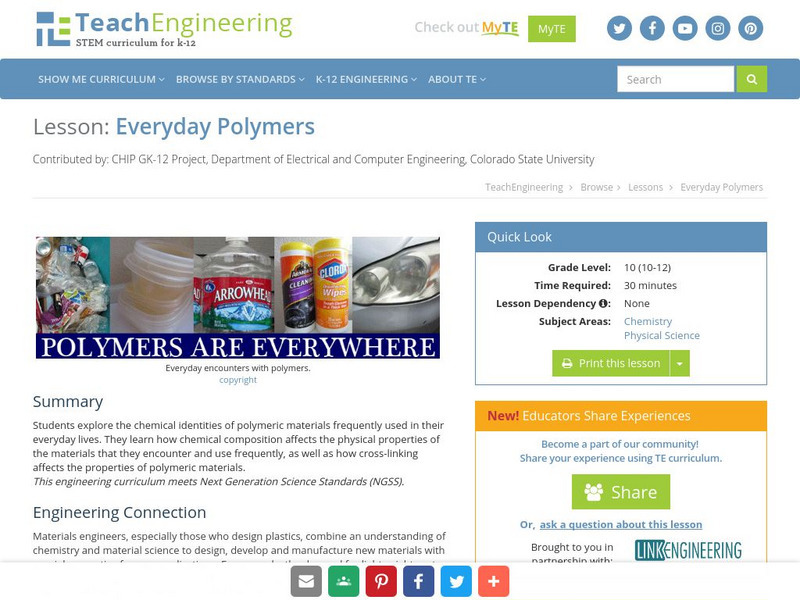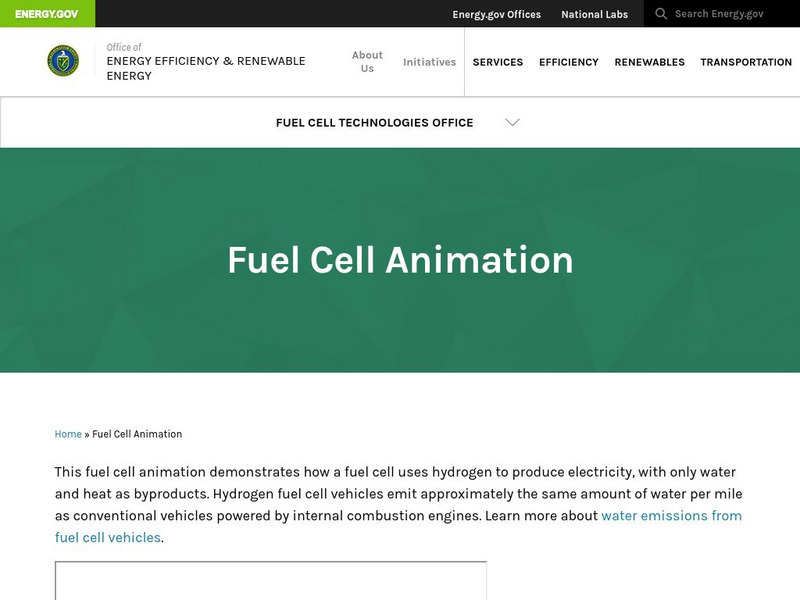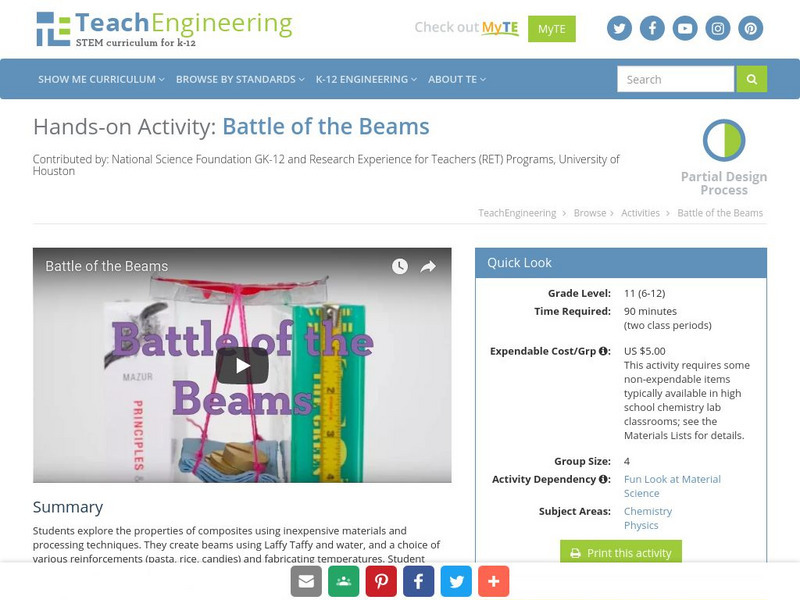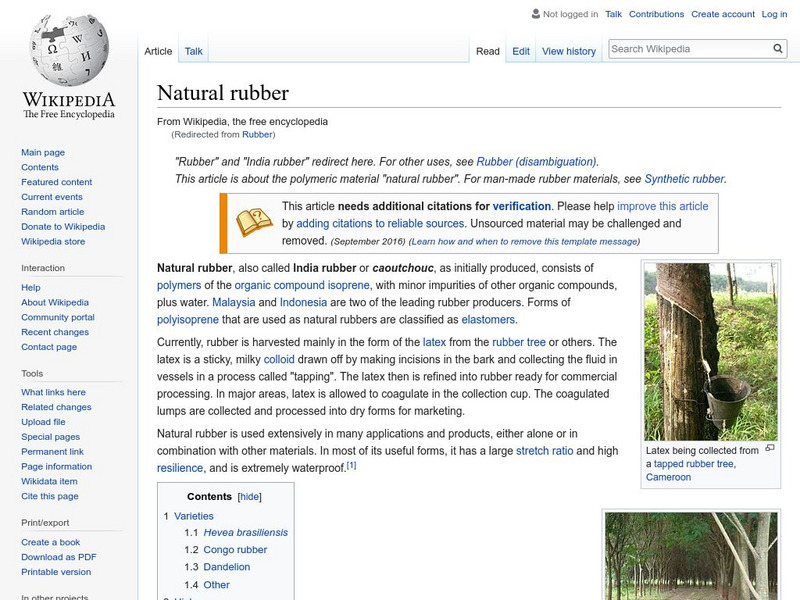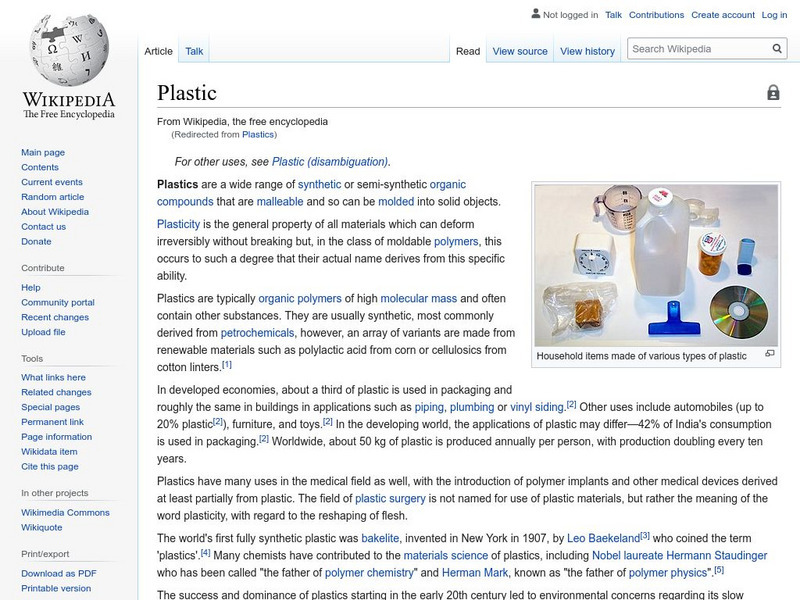Museum of Science
Museum of Science and Industry: Online Science: Activities: Make Slime
Step-by-step instructions, with photos, of how to create slime made of polymer chains using Borax and white glue.
Science Education Resource Center at Carleton College
Serc: Investigating Plastic Polymers: Building a Model
Students will use their prior knowledge about changes of matter including physical and chemical changes from the Houghton Mifflin science curriculum. Students will create a hypothesis to test the physical properties of materials such as...
Science Education Resource Center at Carleton College
Serc: Investigating Polymers: Comparing Two Liquid Glue Based Polymers
For this experiment, students will work in small groups to create two different polymers, similar to Flubber and Silly Putty, using Elmer's glue, liquid laundry starch, and Borax. They will then compare the properties of the two...
Science Education Resource Center at Carleton College
Serc: Mn Step: Where in the World Can I Find Plastic Polymers. Why Are They Used?
An investigation of where plastic polymers can be found in everyday life. After identifying them, students test them to learn about their properties, then try some online activities.
Science Education Resource Center at Carleton College
Serc: Polymers & Plastics: Classification & Models
Young scholars will use their prior knowledge about changes of matter including physical and chemical changes to examine and categorize various types of plastics (polymers). They will identify how their chemical properties allow them to...
Chiral Publishing
Chiral Publishing: An Introduction to Chemistry: Organic Chemistry/biochemistry/synthetic Polymers Study [Pdf]
Use this site to get an overview of organic chemistry, biochemistry, and synthetic polymers. Also includes an answer key to the chapter review questions and links to online quizzes.
TeachEngineering
Teach Engineering: Everyday Polymers
Young scholars explore the chemical identities of polymeric materials frequently used in their everyday lives. They learn how chemical composition affects the physical properties of the materials that they encounter and use frequently,...
US Department of Energy
U.s. Department of Energy: Fuel Cell Technologies Program: Fuel Cell Animation
A series of animated illustrations show how a polymer electrolyte membrane fuel cell works. PEM fuel cells are the most common type used in flex-fuel vehicles.
Other
Polythene: Production and Properties & Uses
A wonderful site for information on polythene. Contains a table of information for high density and low density polyethylene (LDPE and HDPE) which tells melting point, uses, chemical properties, and more for each. Also contains the...
TeachEngineering
Teach Engineering: Battle of the Beams
Students explore the properties of composites using inexpensive materials and processing techniques. They create beams using Laffy Taffy and water, and a choice of various reinforcements (pasta, rice, candies) and fabricating...
Science Education Resource Center at Carleton College
Serc: Plastic Polymers: Investigating Their Flexibility
Young scholars will use their prior knowledge about changes of matter to develop a hypothesis to test the physical properties of materials such as plastic (polymers) and how its chemical properties allow it to have unique physical...
York University
Chemistry Hall of Fame: Polyethylene a Plastic of Many Uses
Background information on the discovery of polyethylene is found on this website. Also lists polyethylene's many uses.
TeachEngineering
Teach Engineering: Creepy Silly Putty
Students learn about viscoelastic material behavior, such as strain rate dependence and creep, by using silly putty, an easy-to-make polymer material. They learn how to make silly putty, observe its behavior with different strain rates,...
Wikimedia
Wikipedia: Rubber
Wikipedia provides detailed information on rubber, a hydrocarbon polymer. Includes information on the composition and uses of rubber.
Wikimedia
Wikipedia: Fuel Cell
A detailed Wikipedia encyclopedia article on fuel cells explains what they are, the controversies in the use of hydrogen as a fuel, and practical problems. There is also a lengthy section on the five generally recognized types of fuel...
Other
San Diego Plastics, Inc.: Polyethylene
The features, applications, and the fabrication process of high density and low density polyethylenes are listed and described.
TeachEngineering
Teach Engineering: Surfactants: Helping Molecules Get Along
Students learn about the basics of molecules and how they interact with each other. They learn about the idea of polar and non-polar molecules and how they act with other fluids and surfaces. Students acquire a conceptual understanding...
TeachEngineering
Teach Engineering: Flocculants: The First Step to Cleaner Water!
Students experience firsthand one of the most common water treatment types in the industry today, flocculants. They learn how the amount of suspended solids in water is measured using the basic properties of matter and light. In...
Wikimedia
Wikipedia: Plastic
Wikipedia offers all of the basic information one would need about the topic of plastic. Includes hyperlinked table of contents for easy site navigation.
TeachEngineering
Teach Engineering: Preconditioning Balloons
Students use balloons (a polymer) to explore preconditioning a viscoelastic material behavior that is important to understand when designing biomedical devices. They improve their understanding of preconditioning by measuring the force...
TeachEngineering
Teach Engineering: Fun Look at Material Science
Students are introduced to the multidisciplinary field of material science. Through a class demo and PowerPoint presentation, they learn the basic classes of materials (metals, ceramics, polymers, composites) and how they differ from one...
Curated OER
Smithsonian Institution Archives: Jeanne Helen Osiecki (B. 1926)
A native of Switzerland, organic chemist Jeanne Helen Osiecki (b. 1926) had received her Ph.D. from Stanford University in 1960 and began working at Lockheed Missiles and Space Co. in 1961. When this photograph was distributed, Osiecki...

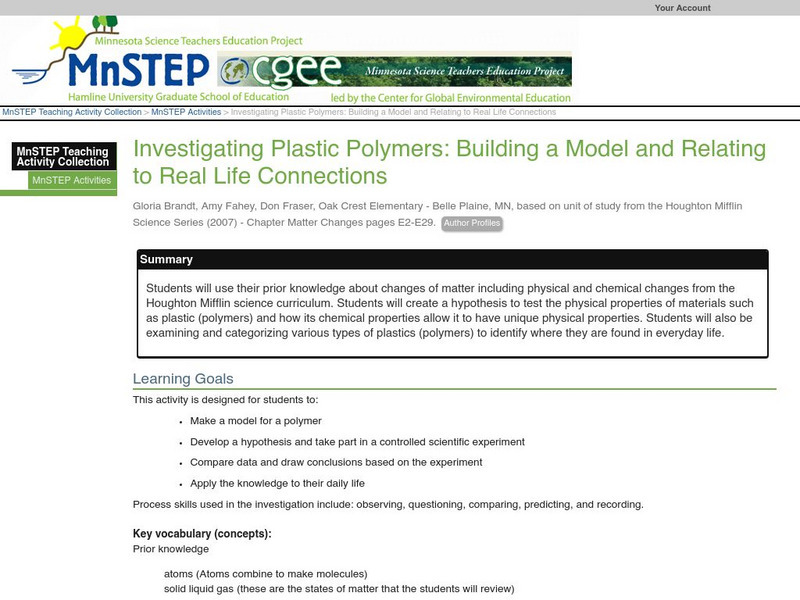



![Chiral Publishing: An Introduction to Chemistry: Organic Chemistry/biochemistry/synthetic Polymers Study [Pdf] eBook Chiral Publishing: An Introduction to Chemistry: Organic Chemistry/biochemistry/synthetic Polymers Study [Pdf] eBook](https://static.lp.lexp.cloud/images/attachment_defaults/resource/large/FPO-knovation.png)
